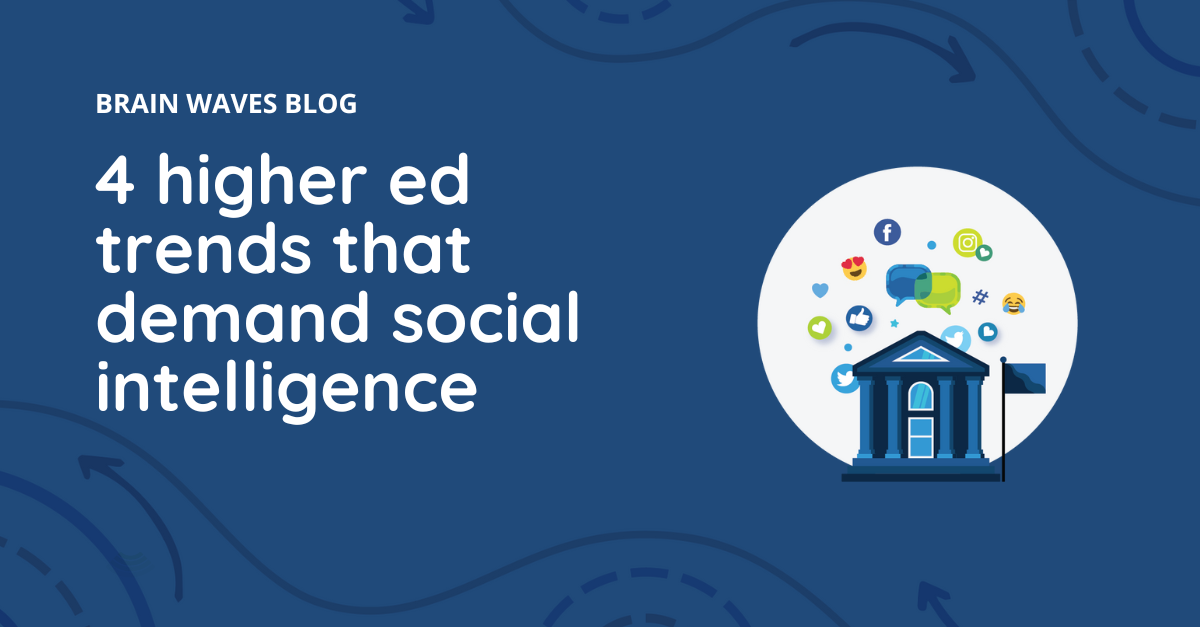4 higher ed trends that demand social intelligence

Social intelligence is a growing global industry. Insights gleaned from publicly available online conversations inform billion-dollar entertainment productions, real estate and technology decisions for new restaurant chains, and product formulary for food and beverage companies amidst emerging consumer health concerns.
The Women in Social Listening & Insights podcast highlights applications like these. As this month’s guest, I was asked about trends that will shape the future of social intelligence in higher ed. It’s barely a soundbite in the episode, so here’s my complete answer.
 Increased institutional pressure demands faster, more effective feedback loops.
Increased institutional pressure demands faster, more effective feedback loops.
Presidents and boards need to understand how the institution’s reputation is faring in real-time, in a landscape that’s sometimes changing day-by-day. Rather than the fire-fighting approach common in communications teams, the feedback must be contextualized within a strategic approach to reputation management. Most marketing leaders realize that isn’t happening with their in-house solutions. Yet, they know it should be something they can accomplish using social listening. Leaders will demand more of their teams, or look to partners to fill the gap.
An effective approach will enhance risk assessment, bolster confidence in decision-making, and maintain strategic focus within a turbulent environment. Innovative expertise with crucial industry context to navigate today’s digital communications landscape is critical for campuses today.
 Leaders look to fundraising as a financial backstop, despite challenges engaging younger donors.
Leaders look to fundraising as a financial backstop, despite challenges engaging younger donors.
Given the uncertain funding environment, Advancement teams will be asked to generate additional revenue to fill the gap. However, the higher ed advancement profession is facing some serious headwinds. In addition to challenges attracting and retaining mid-level and senior staff, many teams struggle to effectively engage the bottom two-thirds of the donor pyramid, particularly Gen Xers and Millennials. Social intelligence has incredible potential to fuel both alumni engagement (nurturing) and strategic donor outreach (prospecting) to increase revenue.
 Rebuilding public trust requires increased understanding of audiences.
Rebuilding public trust requires increased understanding of audiences.
One of the reasons public trust in higher ed has been decreasing is we lost track of the needs and voices of students, as well as policy-makers. Not only are there generational differences in expectations, but the demographics of a student have changed drastically in the last few decades. Social listening not only gathers insight at scale, it elevates the stories of people and their experiences. These voices need to be heard for higher ed to rebuild public trust.
The current political environment makes it challenging to learn more about the experiences (and distrust) of any cohort that can be considered a protected class. Because social intelligence gathers public data organically, it’s an excellent method to ensure the voices of students and consumers with the highest need are considered in the research process, without requiring direct participation in data collection. Social intelligence professionals with a strong understanding of online behavior and platform participation rates, as well as the higher ed industry, can identify indicators and context clues to inform robust analysis that informs trust-building strategies.
 The power of peer influence can no longer be ignored.
The power of peer influence can no longer be ignored.
Whether it’s TikTok, Reddit, or Instagram, most of us know that peer influence is now driving decisions of where to go to college, what career to pursue, and more. Reddit is increasingly important because it’s often the first place students crowdsource information—44% of people between ages 18–29 use it as an immediate and authentic source of information.
Reddit posts are increasingly accessible to people who don’t use the platform, thanks to a 2024 partnership with Google that “facilitates more content-forward displays.” Reddit now shows up at the top of many Google search results—including “should I go to college.”
The authentic, often anonymous conversations happening on Reddit are a gold mine of consumer sentiment and experience data. Social intelligence makes use of that data efficiently and effectively. You’ll see more about that from us next month when we release our latest research.
Did I miss something? Please, share your thoughts with me.
